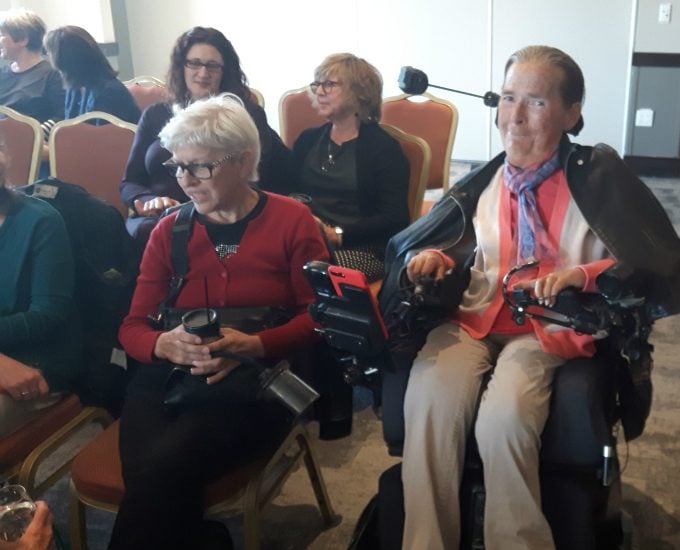This is a joint media release of People First Canada and People First Nova Scotia
Winnipeg, MB, March 13, 2019 – The Nova Scotia human rights board made its ruling last week on the case of three individuals who had been confined in a hospital ward for years. The ruling found that the province did discriminate against Beth MacLean, Joey Delaney, and Sheila Livingstone. Livingstone died before the inquiry began.
The members of People First of Canada (PFC) and People First Nova Scotia (PFNS) have a lot of mixed feelings about the decision. We are very pleased and happy for the individuals who won their case. Their human rights were violated and they deserve to have that recognized and addressed.
We are disappointed that the Chair of the inquiry board, Walter Thompson, did not find that the province discriminated against people with disabilities who are still living in institutions in the province, or those who are on a waitlist for housing. He ruled that each person’s situation must ‘be assessed individually.’ Given that it took close to five years for this inquiry for three individuals – it doesn’t give much hope to the 1500 that remain institutionalized or in inappropriate housing.
And, admittedly, we are a little confused. There is a lot to understand in Thompson’s 109 page ruling. But the one part that has confused us the most is Thompson’s comments on Dr. Catherine Frazee’s testimony. Dr. Frazee spoke about ‘ableism’ in our society and our systems. Ableism is discrimination and prejudice against people with disabilities.

Thompson wrote that, although he allowed the testimony, he ‘resisted’ her evidence of ableism. In his ruling, he wrote, “If I am speaking from a position of privilege and am “un-woke”, then so be it”. He also wrote that in 40 years of service, he has never even seen a ‘taint’ of the ableism that Dr. Frazee testified about.
What does that mean? Does it mean if he doesn’t understand or get the idea of ‘ableism,’ then that’s it, too bad? Does it mean that if he hasn’t seen it, it doesn’t exist? It is his way of saying ‘Whatever – I don’t get it.’? The members of PFC and PFNS live in the world of intellectual disability and have many examples of ableism that we can share with Thompson to help further his understanding of the idea. Here are just some of the examples we can provide.
People with intellectual disabilities and mental health disabilities are institutionalized, and live with the risk of being re-institutionalized, more than any other group in society. This is an example of ableism.
People with intellectual disabilities have often been (and still are) denied education or have had segregated and limited education. This is an example of ableism.
People with intellectual disabilities have had their reproductive rights taken away from them through surgery (sterilization). This is an example of ableism.
People with intellectual disabilities are often put under guardianship or trusteeship and denied the right to make their own decisions. This is an example of ableism.
People with intellectual disabilities have one of the lowest employment rates of any group in society. This is an example of ableism.
People with intellectual disabilities are one of the groups in society that are often harmed and sometimes killed by their family or caregivers who are supposed to protect them. In Canada, since 1993, over 30 people with disabilities have been murdered by their family or caregivers. Almost 60 percent of those killed were people with intellectual disabilities. This is the most extreme example of prejudice, discrimination and ableism towards people with disabilities in our society.
If this doesn’t get the idea across to Mr. Thompson, perhaps these examples of ableism from his own province will help the idea to hit home.
In Sydney, NS, Braemore Home staff kept a resident with autism in solitary confinement for 15 days with a light on constantly, and he was videotaped. A report on the home identified ‘workplace culture’ as one of the biggest problems with the home. Everything is about the staff and the schedule – not the residents. This is an example of ableism.
The town of Bridgewater, NS, rejected a wheel-chair accessible small-options home for three to five adults with disabilities in a residential neighbourhood (against their own bylaw). Everyone involved was for this small-options home, except for the town and two neighbours who did not want ‘those people’ living there. This is an example of ableism.
In an elementary school in Dartmouth, NS, special needs students were put inside a fenced-in hockey rink during lunchtime. They were not allowed to play with the other students. When questioned, the school board said it was done for ‘safety’s sake.’ The school board also said that the special needs students could invite the other students into the segregated area if they wanted. The rink was littered with dog poop bags and broken beer bottles. This is an example of ableism.
In large institutions in Nova Scotia, like Kings (Waterville) and Quest (Lower Sackville), police interventions have increased. Police have been called for such offences as throwing a shoe, throwing a foam letter, pushing somebody, and striking someone. Keep in mind that these ‘offences’ occurred while people with intellectual disabilities were institutionalized at these facilities. These ‘offences’ mean that people enter the justice system with no support and they are sometimes re-institutionalized in jails. This is another example of ableism.
We could go on and on – unfortunately there are many examples to choose from. But we hope that this will help Mr. Thompson to understand what ableism is and not just dismiss the idea because he doesn’t get it or can’t recognize it when he sees it.
To completely dismiss the idea that people with disabilities are discriminated against in most every system in our society is not someone being ‘un-woke’ – this is someone who is completely unaware and obviously not paying attention.
Kory Earle (President, PFC); and Donna Muise (President, PFNS) – on behalf of the membership of PFC
People First of Canada is the national voice of people who have been labelled with an intellectual disability. The vision of People First is to see all citizens living equally in the community. For further information contact Shelley Fletcher, Executive Director for People First of Canada Phone: 204-784-7362 or by Email: sfletcher@peoplefirstofcanada.ca Find out more at www.peoplefirstofcanada.ca
People First Nova Scotia (PFNS) is a self advocacy group of members who have been labelled with an intellectual disability. For further information, contact Cindy Carruthers, Executive Director for PFNS. Phone: email: pfns2014@gmail.com
Catherine Rodgers, Director of Communications, People First of Canada, Email: crodgers@peoplefirstofcanada.ca
See also:NS Human Rights Board ruling of discrimination in warehousing case disappointing
With a special thanks to our generous donors who make publication of the Nova Scotia Advocate possible.
Subscribe to the Nova Scotia Advocate weekly digest and never miss an article again. It’s free!



